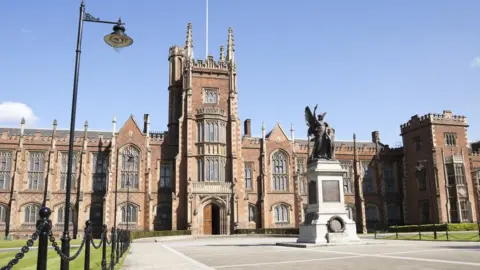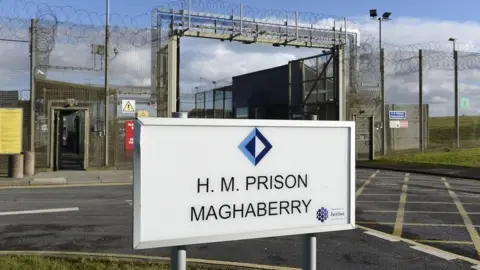NI politics: What issues are in new ministers' in-trays?
 Getty Images
Getty ImagesStormont has a new set of ministers - parties selected the departments they wanted during the assembly's first sitting on Saturday.
Sinn Féin, the Democratic Unionist Party (DUP), Alliance and Ulster Unionist Party (UUP) were all entitled to posts, while the justice minister was elected by a cross-community vote in the assembly.
But with no devolved government in almost two years causing increasing budget pressures, there is no shortage of challenges facing the new ministers.
Here are some of the main priorities they will need to tackle in the days and weeks ahead.

The Executive Office
by Jayne McCormack, BBC News NI political correspondent
The First Minister Michelle O'Neill and Deputy First Minister Emma Little-Pengelly were nominated from the two biggest parties in the assembly - Sinn Féin and the DUP.
Unlike the rest of Stormont's nine departments, two parties jointly run this office and any decision requires sign-off from both of them.
 Getty Images
Getty ImagesA key decision will be finding a new commissioner for victims and survivors of the Troubles, after Ian Jeffers announced he was stepping down.
The Executive Office also has responsibility for fulfilling the recommendations of the 2017 report on Historical Institutional Abuse.
It recently emerged that work on a permanent memorial to victims and survivors has advanced, but ministers will need to green light the final plans.
Tackling domestic abuse and ending violence against women and girls also falls under this department's remit.
While a draft strategy was published in summer, publishing a report and implementing an action plan will be on the first and deputy first ministers' to-do list.
The Executive Office will also be responsible for the appointment of new Irish and Ulster-British Commissioners, implementing laws passed by Westminster in 2022.

Finance
by John Campbell, BBC News NI economics editor
Finance Minister Caoimhe Archibald will lead the effort to allocate the money from the UK government's £3.3bn package.
There are two pressing priorities: setting a budget for the new financial year in April and settling the public sector pay disputes which led to January's huge strike.
Departmental officials will have a budget almost ready to go in draft form but an additional £500m or more from the financial package will have to be added to that.
But it will still be a difficult budget for many public services.
 PA Media
PA MediaThe almost £600m for public sector pay will not automatically settle the disputes but it will allow the minister to set a pay policy and authorise the start of negotiations.
That may be enough to see some industrial action suspended.
Rates, the property taxes paid by households and businesses, are also part of the Ms Archibald's brief and require two significant decisions.
Firstly, she must set next year's regional rate, the part of the bill which funds NI-wide services.
Given the strain on public finances, a significant increase in rates cannot be ruled out.
Ms Archibald will also have to consider the responses to a wider consultation on the rates system and possibly bring forward proposals which would remove or phase out some rates reliefs.

Health
by Marie-Louise Connolly, BBC News NI health correspondent
Top of the pile for Health Minister Robin Swann is securing pay parity as Northern Ireland health and social care staff remain the lowest paid in the UK and are yet to be offered a pay uplift for 2023-24.
The public need assurance, too, especially around waiting lists.
That will require a substantial, sustained, and recurrent funding package to tackle the backlog.
That package will accelerate transformation and the continued roll-out of centres of excellence.
The service needs more nurses, but that means restoring the number of training places.
Funding services in social care would have a positive knock-on effect for other areas especially emergency departments.
 Getty Images
Getty ImagesGeneral practice is on its knees; its survival requires the continued roll-out of multi-disciplinary teams, including physiotherapists and social workers.
Prioritising workforce planning is the key to everything, especially rebuilding staff morale.
Another big issue is the creation of a dedicated women's health strategy, like elsewhere in the UK and the Republic of Ireland, which would encompass and refocus gynaecological services.
Training places and more flexible pension plans will not only help to grow staff numbers but help retain them.
Meanwhile, health promotion and prevention require a reset - and a plan already exists.
The Bengoa Report - an ambitious 10-year plan to overhaul Northern Ireland's health and social care system - should be in its eighth year of implementation.
Mr Swann will not have much time to get reacquainted with his former brief - he will need to listen to clinicians then hit the ground running.

Education
by Jayne McCormack, BBC News NI political correspondent
The education budget faced a massive squeeze this year when its available finances were reduced by about 2.5%.
Its budget is Stormont's second biggest (behind health) but the department said there was a £300m gap between what is needed to run the education system and what it has.
Teaching and non-teaching staff seeking a resolution over long-running pay deals have already been on the picket line, taking part in Northern Ireland's biggest strike for decades.
While the government has said it is making money available to cover this, it will fall to Paul Givan of the DUP to implement a pay deal.
 Getty Images
Getty ImagesOn top of that, civil servants, who in the absence of ministers had to make savings in the education budget, ended schemes like the school holiday food grant for pupils entitled to free school meals.
Could Mr Givan find the cash to bring that back?
Throw in demands for money for new school buildings, youth services, school transport among other things and it is already a long list without even mentioning the r-word: reform.
An independent review of Northern Ireland's education system published in December recommended expanding early years education and provision of services for children with special educational needs (SEN).
Mr Givan also has new legislation to put into practice: the Integrated Education Act brought by Alliance assembly member Kellie Armstrong in 2022, which means the department must 'encourage, facilitate and support integrated education'.
There had been fierce debate over the law, which was criticised by some school bodies and the four main churches.
That debate could now be reignited.

Economy
by Clodagh Rice, BBC News NI business correspondent
The Department for the Economy has typically been quite a sought-after brief, chosen first or second by political parties, as it might previously have been associated with photo calls and job announcements.
However, like all government departments, it is facing significant budgetary constraints and the local economy is facing global headwinds.
The department, now headed up by Conor Murphy of Sinn Féin is responsible for economic policy and has launched a vision known as 10X that will need to be reviewed.
 Getty Images
Getty ImagesInvest NI, Northern Ireland's economic development agency, is an arm's length body of the department which is going through a transition period following a scathing independent review earlier this year.
The review highlighted challenges for both the department and Invest NI and as a result, Invest NI's focus will shift from job creation to overall productivity.
Productivity is a big problem as Northern Ireland significantly lags behind the UK average, any incoming minister will need to attempt to address this.
One way in which to do that is by improving our skills base through both further and higher education.
Earlier this year, the department modelled the introduction of higher tuition fees, one possible revenue raising measure that has yet to be consulted on. That could be something for a future minister to decide.
The department is also responsible for energy and the path to net zero.
It has signalled its intention to introduce a renewable energy support scheme in line with the energy strategy, but that would need a minister to sign off.
Tourism is another important part of the brief, a draft tourism strategy is currently out for consultation on a 10-year plan on how to attract more visitors here.
There are other issues that business organisations would like to see movement on which affect the economy including a childcare strategy to help parents return to work, business rates relief that some sectors have received in the rest of the UK and planning reform.
However these issues are complex and will require cross-cutting work across a number of other departments.

Agriculture, Environment and Rural Affairs
by Louise Cullen, BBC News NI agriculture and environment correspondent
The UK's advisory body on climate change, the Climate Change Committee, has already expressed concern about Northern Ireland's ability to meet its legally-binding climate obligations.
The national environmental watchdog, the Office for Environmental Protection, has said it is "disappointed" that an Environmental Improvement Plan (EIP), an obligation under the 2022 Climate Change Act, has had to be deferred in the absence of a minister to approve it.
 Ashley Cooper/ Getty Images
Ashley Cooper/ Getty ImagesIn its place, the draft Environment Strategy is being updated so that it will be ready for executive sign-off to then become an EIP.
Other decisions that new minister Andrew Muir will have to consider include:
- a consultation on draft Environmental Principles Policy Statement
- an amended version of the Round 3 Roads Noise Action Plan
- agreements on aquatic animal health regulations and invasive alien species legislation
Executive approval is also required for the final peatlands strategy, the food strategy framework and the revised green growth strategy, which places economic growth in an environmental context.

Infrastructure
by Louise Cullen, BBC News NI agriculture and environment correspondent
Last year, the department now led by Sinn Féin's John O'Dowd, said there were seven outstanding decisions that could not progress without ministerial or executive approval.
Ministerial decisions will be needed on several major issues.

Last year, a public consultation was launched on whether over-60s should retain free bus and train travel and those findings could potentially feed into major changes.
The Belfast Metropolitan Transport Plan is also languishing in the in-tray.
It has also been acknowledged that the major roads programme needs overhauled in light of the climate change legislation passed in 2022.
A number of previously-approved roads projects have been prioritised as the department tries to make the required budget savings.
The draft Road Safety strategy, which was published with ministerial consent, will also require executive sign-off.

Communities
by Mark Simpson, BBC News NI communities correspondent
Top of the in-tray for the DUP's Gordon Lyons is the Casement Park redevelopment project in west Belfast.
Although it is mainly for Gaelic games, there is a race against time to get it ready for soccer matches at the 2028 European Championships.
 Inpho
InphoAt the same time, football league clubs will be banging on the minister's door asking for money from the sub-regional stadia fund to help improve their facilities.
The department has a broad range of responsibilities including housing, homelessness services, public realm schemes, the voluntary sector and the arts.
They will all bring their own pressure on Mr Lyons' time, and budget.

Justice
by Julian O'Neill, BBC News NI crime and justice correspondent
Not alone, the Department of Justice, now overseen by Naomi Long, has felt the financial squeeze and it has created major problems, most obviously, within policing.
About 70% of its budget, about £800m, goes to the Police Service of Northern Ireland (PSNI).
However, it has not been enough in inflationary times and cost-cutting has seen officer numbers fall below 6,500, a record low.
There is also the issue of funding a 7% pay rise.
Whether the situation improves will come down to additional finances and deciding upon priorities.
 PA Media
PA MediaJust prior to the collapse of Stormont in 2022, then Justice Minister Naomi Long was looking at new legislation on hate crime.
This followed a judge-led review and could come back onto the agenda.
Likewise, there was also a public consultation on introducing 'Charlotte's Law'.
Named after Charlotte Murray, murderers would face tougher sentences if they did not disclose the location of a victim's remains.
There is also likely to be renewed focus on reforms to speed up the justice system.
